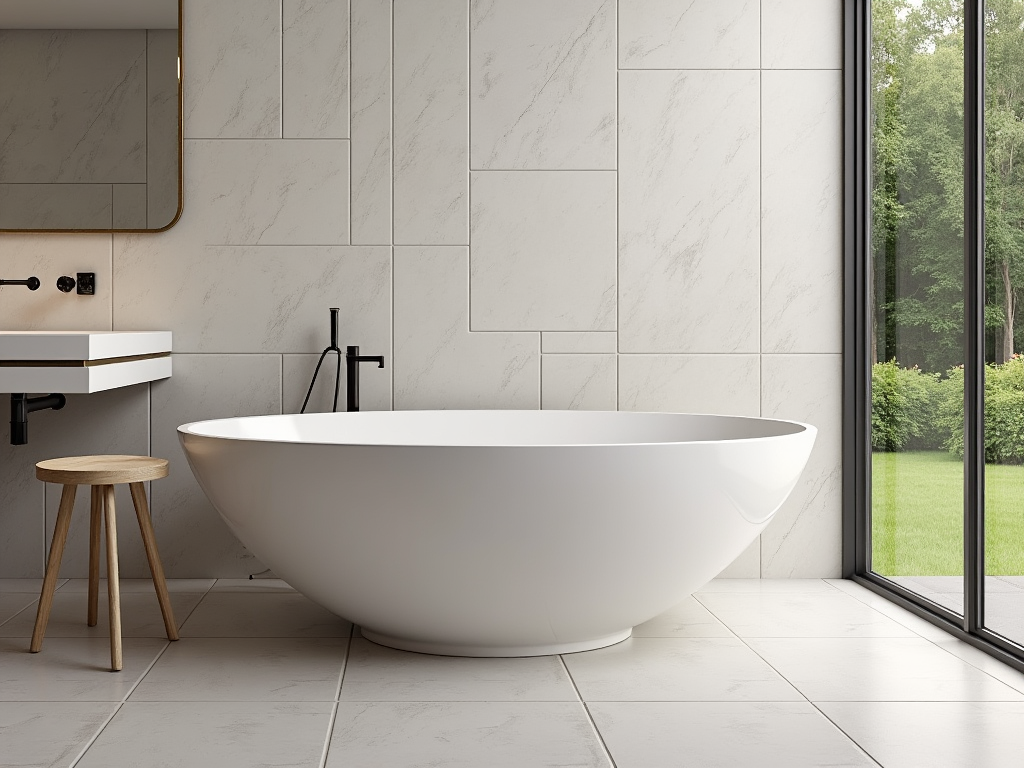Quick facts
Can't find the answer you're looking for? Please get in touch with our friendly team.
How to trim a tile that is already installed?
To trim installed tile, use a tile cutter or a wet saw for precision. Mark the desired trim line on the tile, then carefully cut along that line. Use a grout saw to remove grout if necessary, and finish edges with a tile file for a smooth finish.
What are the rules for tile trim?
When installing tile trim, ensure it matches the tile color and style. Use the correct adhesive and allow for expansion gaps. Trim should be cut accurately to fit corners and edges. Always clean the surface before installation for a secure bond.
Do you put tile trim on before tiling?
No, tile trim should be installed after tiling. First, lay the tiles and allow the adhesive to set. Once the tiles are in place, you can attach the trim to cover the edges and provide a finished look.
What is tile trim called?
Tile trim is commonly referred to as tile edging or tile molding. It is used to cover the exposed edges of tiles, providing a finished look and protecting the edges from damage. Different styles include quarter round, bullnose, and straight edge trims.
How do you finish the edges of tile?
To finish the edges of tile, you can use tile trim or bullnose tiles for a clean look. Alternatively, apply grout to fill gaps and seal with caulk for a waterproof finish. Ensure all edges are smooth and even for a professional appearance.
Does tile have to match throughout the house?
No, tile does not have to match throughout the house. Different areas can have different tiles to create distinct styles. However, maintaining a cohesive look is important. Choose complementary colors or patterns to ensure a harmonious flow between spaces.
Can I add tile trim after tiling?
Yes, you can add tile trim after tiling. Ensure the tiles are clean and dry. Use a strong adhesive suitable for your trim material, and press it firmly in place. Allow it to set according to the manufacturer's instructions for best results.
Category Overview
Introduction
Tile trim serves a crucial purpose in any home, acting as a vital finishing touch that enhances both aesthetics and functionality. Beyond just visual appeal, tile trim minimizes rough edges, provides clean lines between different surfaces, and adds an element of sophistication to your tile installations. Whether you’re looking to create a soothing retreat in your bathroom or elevate the style of your kitchen backsplash, the right tile trim can significantly enhance your everyday living experience.
Functionality
Tile trim is primarily used to cover edges and corners where tiles meet walls or floors, offering protection against chips and damage. You’ll find it utilized in various areas of the home—from kitchens and bathrooms to outdoor patios. One notable function is its ability to transition between different materials seamlessly, providing a neat edge between tile and other surfaces like wood or carpet. Some trims even feature adjustable designs that allow for unique applications in different environments—whether you're working with intricate mosaic patterns or large format tiles.
Design & Style
Tile trims come in an array of styles and materials that can fit any decor theme. Common materials include ceramic, metal, vinyl, and stone, each offering its own aesthetic benefits. For instance, metal trims can add a sleek modern touch, while ceramic options often blend beautifully with traditional setups. Popular variations include bullnose edges for rounded corners or straight cuts for contemporary looks. Personalization is key; you might opt for a brushed nickel finish to complement industrial décor or go for colorful ceramic trims that speak to a more eclectic style. This flexibility allows you to pick the best tile trim for small spaces without compromising on style.
Practical Considerations
Selecting the right tile trim involves considering several practical aspects. Start by assessing the size of the room; larger spaces may benefit from wider trims for balance, whereas smaller areas could look better with slimmer profiles. Durability matters too—if you expect high foot traffic or moisture (like in bathrooms), ensure that you choose materials designed for heavy-duty use. Avoid common mistakes such as overlooking color matching; mismatched finishes can disrupt visual flow within your space.
Comparison and Alternatives
When evaluating tile trim options, it’s essential to weigh pros and cons among common materials like wood versus metal. Metal trims are generally more durable but may come at a higher cost compared to ceramic options which are cheaper but potentially less robust over time. Shapes also play a role: round trims offer softness while rectangular cuts lend themselves well to minimalist designs. Choosing the right design should correlate with both room size and personal style preference—consider how each option complements existing elements within your home.
Trends and Popular Items
Current trends see an increased demand for matte finishes in both metals and ceramics as homeowners embrace understated elegance over shiny surfaces. Also popular are textured trims that add dimension—a great way to enhance visual interest without overwhelming simplicity in design themes such as Scandinavian minimalism or coastal vibes. Items like decorative listellos are gaining favor too—a perfect fit when aiming for something beyond standard functional trim that makes an artistic statement about your personal taste. In conclusion, incorporating well-chosen tile trims into your home not only fulfills practical functions but also elevates overall design aesthetics; whether you're renovating a cozy kitchen nook or refreshing your bathroom oasis, the right choices will make all the difference!


